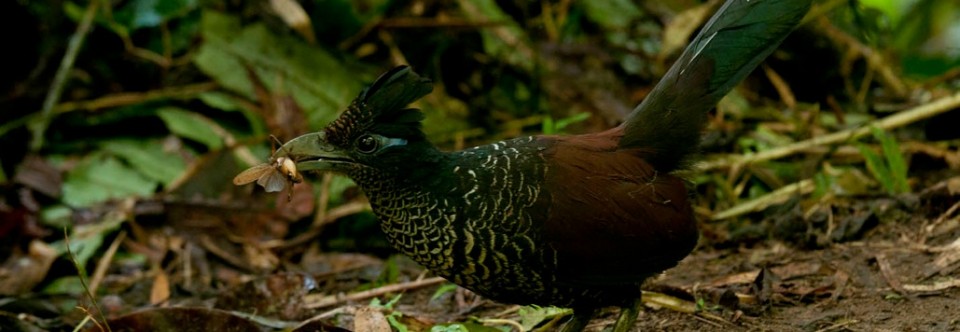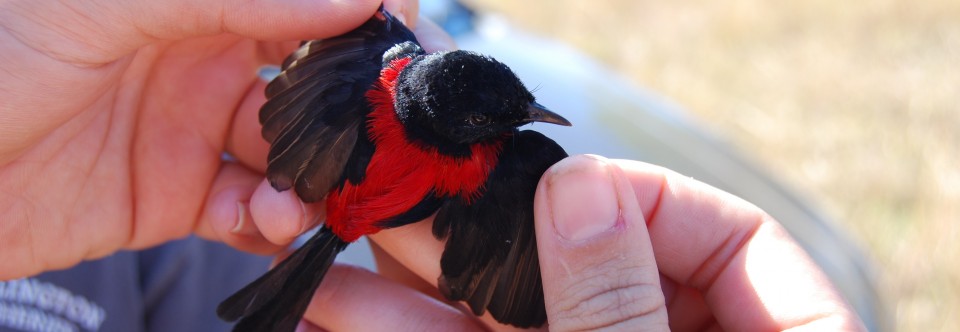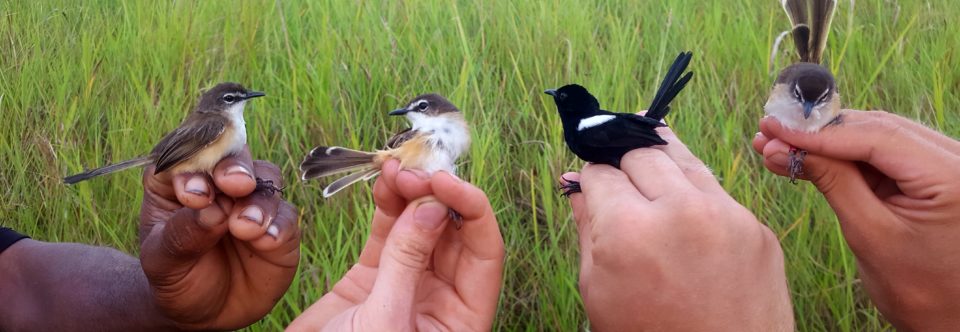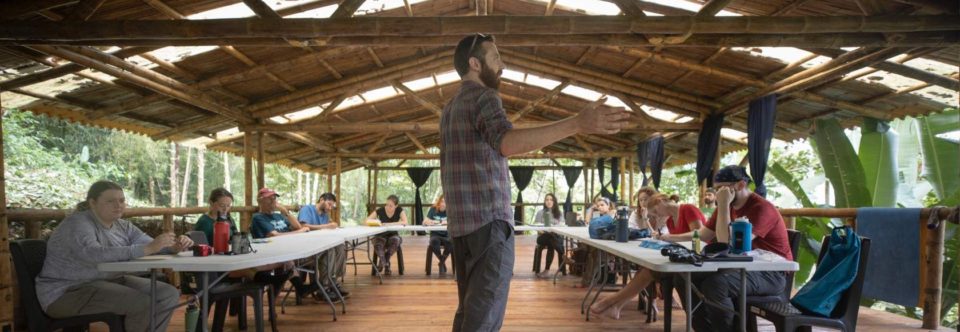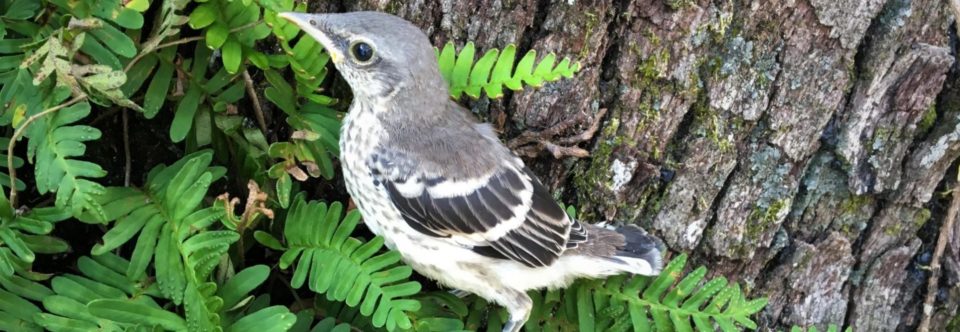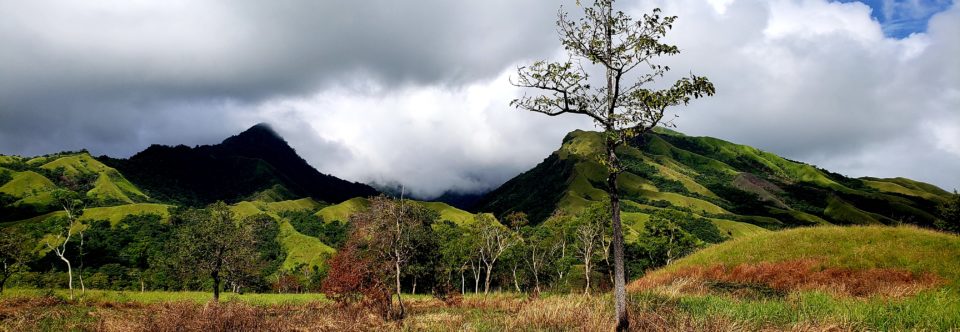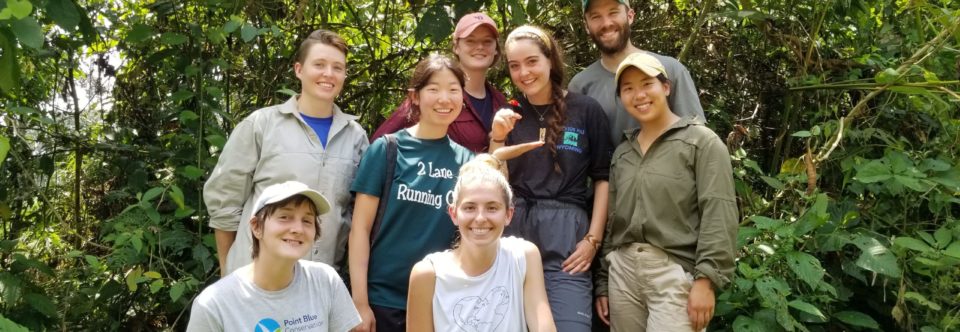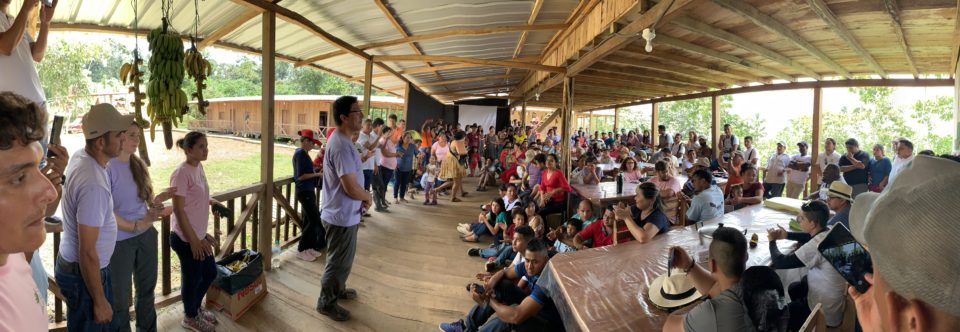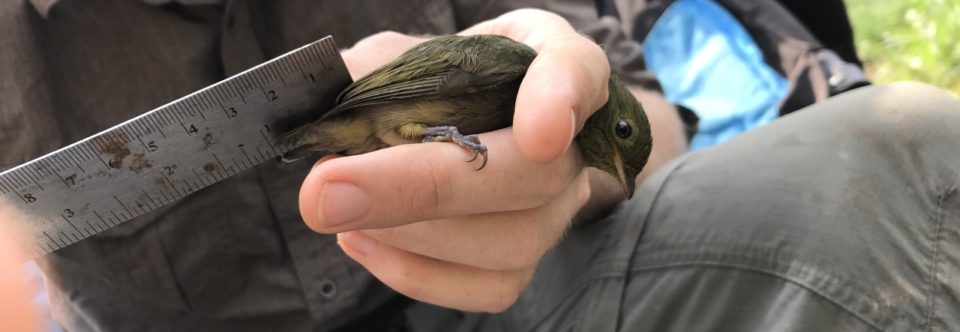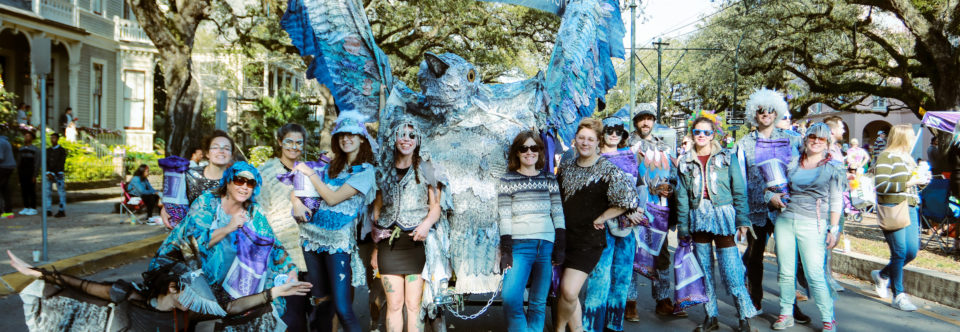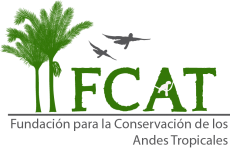"Welcome!"
Welcome! Our lab explores how the environment that organisms experience shapes their ecological, behavioral, evolutionary, and conservation trajectories. We focus our research on animal and plant and plant systems around the world, with active studies on plant-animal interactions, mating systems, demography and survival, signal evolution, movement and dispersal, and endangered species. Our lab takes a socially aware approach that combines community-engaged participatory research with capacity building, training, and education in the biodiversity hotspots where we work.
Fall 2019
Welcome back to school everyone! This semester we welcomed Ph.D. student Luke Anderson. Luke is joining us from the University of Pennsylvania where he studied brown-headed cowbird courtship under the advisement of Dr. Marc Schmidt. He will now focus his research on manakins in the family Pipridae in Ecuador.
Kyu Min Hu and Caitlin McCormick, who both completed their undergraduate studies Tulane last year, have returned to further their education as M.S. students in our lab. We also welcomed Zhiyu (Wendy) Deng as M.S. students in the lab. We also have an outstanding group of undergraduate students working with us. Sarah Leuder completed field work on diversity of palm trees in Ecuador over the summer and will be writing up her honors thesis on that work this year. Margaux Armfield returned from a semester abroad in Scotland and will be conducting her honors thesis on network dynamics of pollination biology. Two juniors, Caroline Camus and Erin Sheehy, have joined the lab and are currently developing their honors thesis projects on lead contamination in pets and lek-breeding manakins, respectively. To round things out, Daleth DelSalto is visiting the lab from Guatemala and Sarah Uher is working as a lab technician.
Former PhD students in the lab have also been active – Jenny Hazlehurst is starting as a faculty member at California State University, East Bay this fall, while Luke Browne has begun a post-doctoral fellowship with Liza Comita at the Yale School of Forestry!
The returning Ph.D. students have been keeping busy since last spring.
Zoe Diaz-Martin has entered her 6th and final year and had a busy summer. She presented her work at the Evolution Conference, co-instructed two courses, and advanced her dissertation research. She spent time in Ecuador at the awesome new FCAT reserve and at the Refugio del Gavilán to help develop long lasting conservation solutions in northwestern Ecuador. This semester she will focus on writing and begin applying to post-doctoral research positions.
John Jones is still in the field! He first spent 2 months in Papua New Guinea working with white-shouldered fairywrens; now and is now working with the red-backed fairywren in Australia under a fellowship awarded from the Australian Government. He is conducting a series of field-based experiments focused on both behavioral ecology and endocrinology and will be home in December to analyze the data – mostly watch video recordings.
Sarah Khalil has spent the last few months working with her committee member, Dr. Irby Lovette, at the Cornell Lab of Ornithology. During that time, she performed ddRAD sequencing to look at the relatedness of New Orleans mockingbirds, in collaboration with Ph.D. student Annelise Blanchette and undergrad Lauren Hitt. She has also been working on a whole-genome resequencing project investigating the genetic basis of red coloration in hybrid fairywrens and presented some of this new work at the American Ornithological Society this June in Anchorage, Alaska, as an invited speaker at a symposium on avian hybrid zones. She will continue working at the Cornell Lab for the fall semester and be back in New Orleans for Spring semester.
Kaushik Narasimhan had a long and productive summer. Along with Sarah Leuder and Lewis Greenstein, he helped create the protocol and set up kilometer-long transects around the FCAT reserve. He also participated in the Ecuador field course, in which he led the student camera trapping project. The cameras revealed a healthy reserve, producing many stunning videos Kaushik also spent much of the summer working in the lab, extracting DNA from leaf tissue of Oenocarpus bataua adults to gain insights into how differences in R genes (AKA Resistance genes) between individuals of the same species contributes to survival advantages. This semester Kaushik is working hard on his prospectus, aiming to defend by the spring!
Annelise Blanchette spent her summer conducting field work on impacts of lead exposure on wildlife in New Orleans. She got plenty of practice finding nests and banding mockingbird nestlings and worked alongside Akhila Gopal to pilot a behavioral study on mockingbird adults. She also completed a pilot study on lead exposure and aggressive behavior on a common lizard Anolis sagrei and and collected plant samples from around Uptown for lead analysis. Annelise will spend her fall semester framing out her dissertation and applying for grants.
Mike Ellis spent three months in Ecuador this summer developing research projects and working with local conservation non-profits. He’s still stoked about his trip to partner reserve Tesoro Escondido where he was lucky enough to see a young Harpy Eagle at its nest. This fall, Mike will be working with Kyu Min Huh and Rachel Cook to publish their work on wildlife diversity patterns in forest fragments. He’ll also be conducting research on regional bird diversity, writing grants, and collaborating with Ecuadorian partners on social outreach and primate conservation programs.
Jordan Karubian has been putting lots of time and energy into exciting conservation, research, and education work in Ecuador with our partners at FCAT. Earlier this year we purchased 164 ha. (320 acres) of rainforest habitat and built a station with capacity for 45 visitors. In August we inaugurated the station by bringing a group of 15 Tulane undergraduates to the site for a two-week immersive course in Tropical Field Biology and Conservation. (EBIO. 3780). It was a success; to quote one student: “I will be going back with a better vision of what I want to do with my life, what I feel is important to prioritize, and a better understanding of field techniques in tropical ecology and conservation. From the perspective of a student, I would say that the program is fantastically successful. I loved every muddy bit of it!” Jordan also received funding from Disney Conservation Fund, our longtime supporters of work in Ecuador, and saw two publications (Enbody et al. 2019, Javůrková et al. 2019) come out with former PhD student Erik Enbody on white shouldered fairy-wrens. Jordan was also named a Fellow of the American Ornithological Society!
Read MoreSpring 2019
Spring has come and gone, and the heat is here to stay in New Orleans. All members of the lab have been busy and productive this semester!
First things first – congratulations to newly minted Ph.D. Candidates John Jones and Sarah Khalil for successfully defending their PhD thesis prospectus’ and to Lauren Hitt, Kyu Min Huh, and Shayna Ross for successfully defending their undergraduate Honors Theses! Good job everyone!
The plus one master’s students have been equally successful in finishing up their programs and preparing to graduate. Congratulations to Rachel Cook, Akhila Gopal, Jiawen Liu, and A.J. Pate.
Further congratulations to our graduating seniors – Lauren Hitt, Kyu Min Huh, and Shayna Ross.
We also welcome undergraduates Margaux Armfield, Sarah Lueder, and Erin Sheehy to the lab, all of whom will be conducting Honors Theses, with Sarah Lueder traveling to Ecuador this summer to collect data for her Honors Thesis.
The PhD students have survived another year and are preparing for the next steps in their academic careers.
Zoe Diaz-Martin attended a landscape genomics course at UNAM, Morelia, Mexico in January. This spring she was awarded the Society for Integrative and Comparative Biology Grants in Aid of Research (SICB GIAR) as well as the International Palm Society’s Endowment Fund Award. This summer she will be co-instructing two summer courses: Conservation Genetics for the Tulane Summer Scholars Program and Tropical Biology and Conservation based at the new FCAT reserve in Ecuador. In addition to teaching, Zoe will be presenting her work at the Evolution Conference in June.
John Jones defended and passed her prospectus and is now officially a Ph.D. candidate! He also received an Endeavour Leadership Program Research Award from the Australian Department of Education. This fellowship sponsors John to spend the Fall 2019 semester in Australia, conducting behavioral endocrinology field research on red-backed fairywrens. He left us for Papua New Guinea in early May for the final field season of his dissertation research after successfully defending his prospectus. He, along with lab alums Erik Enbody and Jenny Hazlehurst, published a paper in Emu describing the social structure and life history of white-shouldered fairywrens and gave a talk at the Society of Integrative and Comparative Biology annual meeting in January. We will all miss him while he is away!
Sarah Khalil also defended and passed her prospectus and is now officially a Ph.D. candidate! In January, she presented her work on the relationship between testosterone, gene expression, and carotenoid plumage in red-backed fairywrens at the Society of Integrative and Comparative Biology (SICB) where she was a finalist for the Division of Comparative Endocrinology Best Student Presentation Awards. This spring semester, she is working in the lab of committee member Dr. Irby Lovette at the Cornell Lab of Ornithology on a whole-genome resequencing project investigating the genetic basis for red coloration in hybrid fairywrens. She is excited to present this work at the American Ornithological Society this June in Anchorage, Alaska where she has been invited to speak at the symposium “Lessons from avian hybrid zones and the maintenance of species boundaries.”
Kaushik Narasimhan is gearing up for a long field season this summer, obtaining three grants for himself and his research assistant, Lewis Greenstein. He will test if the survival advantage of rare genotypes occurs across multiple palm species using a common guard experiment and the relationship of plant immune resistance (R) genes in promoting this survival advantage. Moreover, he will also assist with undergraduate projects in the new FCAT reserve over the summer. Kaushik is wrapping the frugivory camera trapping study, yielding a large and “fruitful” dataset (pun intended). Also, the videos from the camera trap have revealed at least one species that was not previously recorded in Ecuador, and Kaushik is working with a collaborator to produce a communication detailing a range extension for Mustela frenata in NW Ecuador.
Annelise Blanchette attended the Society of Integrative and Comparative Biology annual meeting in January and spent this semester refining her methods and getting ready for her first field season in New Orleans. She will spend the summer monitoring mockingbird nests and piloting behavioral studies on adults. Further, she will work with Akhila Gopal to study the Anolis lizard and quantify the amount of lead in some plants commonly found in the city. Annelise also assisted Lauren Hitt with her Honors Thesis and is very excited to work through all the data.
Mike Ellis assisted Kyu Min Huh with her hummingbird research for her honors thesis and collaborated with Rachel Cook and others on a camera trap study of diversity from Ecuador. He also spent a month in Ecuador training new field personnel for TMA and has begun integrating data from TMA and FCAT mist netting efforts. This summer he returns to Ecuador to identify new research sites and expand pilot data collection for his PhD thesis research. He’ll also be working with tropical ecology classes from Texas State, Tulane, and la Universidad de Especialidades Espíritu Santo while deepening collaboration with the FCAT bird banding team.
And finally, the advisor who makes this all possible for us has been incredibly busy this semester.
Jordan Karubian traveled to Ecuador assist with construction of a field station at FCAT’s new reserve in northwest Ecuador. He has been preparing grant proposals for expanded research and conservation work, and is looking forward to returning to Ecuador later this summer, where he will co-lead a tropical field biology course for Tulane undergraduates (with Zoe Diaz Martin and Renata Ribeiro).
Read More
